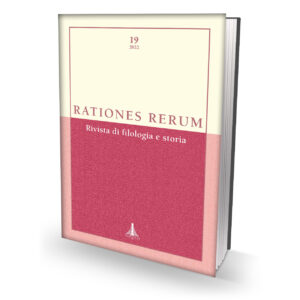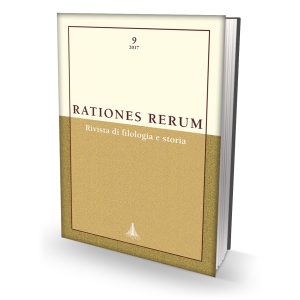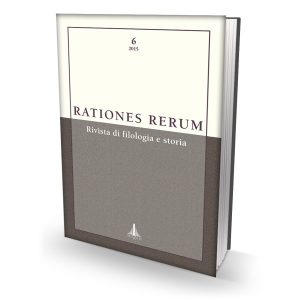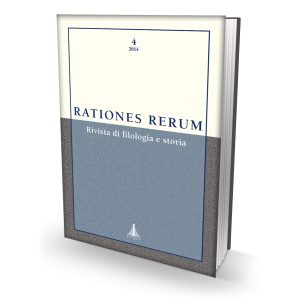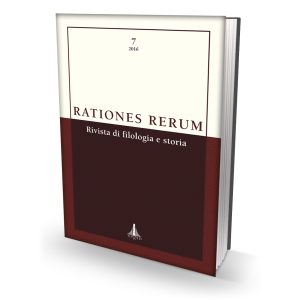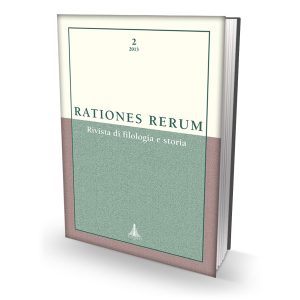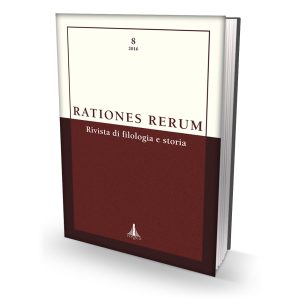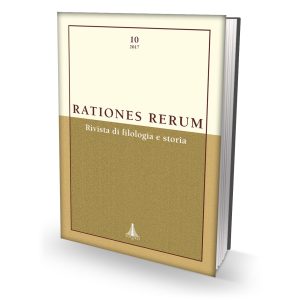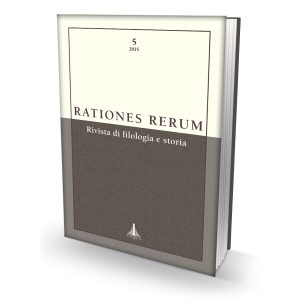RATIONES RERUM 22 – Rivista di filologia e storia
50,00 €
Autori vari
Anno edizione: 2023
Formato 17×24 – Pagine 280
Confezione a filo refe in brossura
Copertina plastificata con bandelle
ISBN 9788899846862 – ISSN 2284-2497
Prezzo: € 50,00
- Descrizione
- ANTEPRIMA
- ABSTRACTS
Descrizione
SOMMARIO
Tradurre i classici
Andrea Balbo – Fabio Pusterla, Introduzione, p. 11
Fabio Pusterla, «Operazioni» e «logiche operative»: appunti sulla traduzione nel Novecento, p. 13 →Estratto
Leopoldo Gamberale, Esperienze di un traduttore involontario, p. 29 →Estratto
Alessandro Fo, Problemi, prove, progressi e compromessi: tu chiamale, se vuoi, traduzioni, p. 49 →Estratto
Guido Milanese, Traduzioni oraziane: ricognizione e spazi di ricerca, p. 77 →Estratto
Andrea Balbo, Tradurre poeti tardoantichi nel XXI secolo, p. 87 →Estratto
Laura Crippa, «Il morto scrittore, di cui e morta la gente e la lingua». Considerazioni su Pascoli e la poesia antica, p. 105 →Estratto
Pietro De Marchi, Giorgio Orelli e i classici: echi e citazioni (qualche appunto), p. 131 →Estratto
Sara Massafra, Tra obbedienza e oltraggio: il latino nelle IX Ecloghe di Andrea Zanzotto, p. 143 →Estratto
Studi e ricerche
Alessandro Campus, Per la storia della scrittura alfabetica. In margine a un libro recente, p. 167 →Estratto
Stefania De Vido, Demetrio e gli altri re, p. 183 →Estratto
Luis Rivero García, Textual Notes on Horace’s Epodes, p. 215 →Estratto
Recensioni
Virgilio Costa, rec. di Pietro Zaccaria, FGrHist Continued IV A, Fasc. 5, Leiden – Boston, Brill, 2021; Stefan Schorn (ed.), FGrHist Continued IV E, Fasc. 2, Leiden – Boston, Brill, 2022, p. 235
Luca Paretti, rec. di Aspetti della Fortuna dell’Antico nella Cultura Europea, a cura di Sergio Audano, Foggia, Il Castello Edizioni, 2023, p. 248
Libri ricevuti, p. 261
Abstracts, p. 269
Indice analitico (a cura di Carlo Di Giovine), p. 273
Istruzioni per gli autori, p. 277
Fabio Pusterla
«Operazioni» e «logiche operative»: appunti sulla traduzione nel Novecento
p. 13-27
The author – who has long dealt with translation, with a particular focus on modern and contemporary European poetry – outlines the main theoretical developments on this issue that characterize the debate of the last fifty years and have profoundly redefined the genre of translation. In fact, it is currently customary to speak of “text-translation”. Next, he discusses the specificity of translations from ancient classics, asking whether, and in what way, it is possible to reflect on them similarly as to how we do so on modern ones.
Leopoldo Gamberale
Esperienze di un traduttore involontario
p. 29-47
The author presents some of his translations from classical (Catullus) and contemporary (Bandini) Latin poetry. He argues that a poetic translation must follow the original text verse by verse and, for each example, highlights the translator’s often empirical criteria and varying levels of approximation and deviation from the Latin text, corresponding to the structural differences of the source and target languages.
Alessandro Fo
Problemi, prove, progressi e compromessi: tu chiamale, se vuoi, traduzioni…
p. 49-76
The author, who translated the Aeneid (2012) and Catullus (2018) for the Turin-based publisher Einaudi, in the first part of the article traces the main problems he encountered in the course of producing these works. In particular, he examines the choice of a rhythmic metric classified as “barbaric”, translation constants (iteration of significant words or authentic “formulas”), as well as specific lexical problems, such as the translation of compounds and diminutives. In the second part, he discusses whether or not it is appropriate to include in translations of ancient texts allusions to very prominent texts (e.g. Dante’s Commedia) from later periods, and concludes by examining some problematic passages of Petronius’ Satyricon, proposing idiosyncratic translations devised – as one might say – “outside the box”.
Guido Milanese
Traduzioni oraziane: ricognizione e spazi di ricerca
p. 77-85
In the light of the extensive research on Horace’s manuscript tradition and translations or adaptations done between the 16th and the 18th century, it is now necessary to study the translations and studies devoted to him in the 19th century. The present study presents a survey of the translations of the Ars Poetica in the early 19th century. Although Romanticism diminished attunement with Horace, editorial interest in his works remains considerable, and therefore comprehensive research seems opportune.
Andrea Balbo
Tradurre poeti tardoantichi nel XXI secolo
p. 87-104
This article offers some reflections on the translations of late antique Latin texts in the 21st century (with a focus on Ausonius, Claudianus and Rutilius Namatianus) and on the role of machine translation and ChatGPT in translation activity.
Laura Crippa
«Il morto scrittore, di cui è morta la gente e la lingua». Considerazioni su Pascoli e la poesia antica
p. 105-129
This article analyzes Giovanni Pascoli’s process of translation from classical into modern language, highlighting that his purpose was to bring a “language of ghosts” to life again. The underlying point of Pascoli’s theory is hidden between the lines of his essay Regole di metrica neoclassica, following which the author gave up imitating ancient rhythm and chose to create a new poetry “ancient but young” and able once again to open “sealed lips”. The article also shows how Pascoli took possession of an ancient text starting from its literal translation, then worked through the Latin remake of the Carmina’s collection, and finally reached the composition in Italian of the Poemi conviviali. Lastly, the article gives an example of this procedure comparing two myths about ancient female figures, Helen and Circe, who in 1899 became the symbols of two ways of approaching classical literature: imitation and inspiration.
Pietro De Marchi
Giorgio Orelli e i classici: echi e citazioni (qualche appunto)
p. 131-142
The author, who has already dealt with Giorgio Orelli’s several translations from Lucretius, focuses here on the quotations and echoes of classical texts in Orelli’s poetic work. In addition, he pays attention to certain re-actualized classical “situations”; for example, the tale of the return to Ithaca, or the narration of something that happens far away and outside the main scene. Some final remarks are devoted to the question of the translation of classical verse into Italian and to the phono-semantic aspect of the texts, both ancient and modern.
Sara Massafra
Tra obbedienza e oltraggio: il latino nelle IX Ecloghe di Andrea Zanzotto
p. 143-163
This article examines Andrea Zanzotto’s relationship with the classical literary tradition, dwelling on his constant respect for conventions and his daring tendency to break them, especially concerning Latin tradition. In his work, and particularly in the poetic collection IX Ecloghe (1962), it is possible to find a direct evocation of Latin language and culture and an explicit use of Latinisms. Mention is also made of the project – never realized – of a multi-voice translation of Virgil’s Aeneid that Zanzotto had proposed to the publisher Mondadori, as preser ved in his correspondence with the publishing house’s secretariat.
Alessandro Campus
Per la storia della scrittura alfabetica. In margine a un libro recente
p. 167-181
The publication of the book Il dono di Cadmo by Alessandro Magrini offers an opportunity to revisit two central themes in the history of writing : the definition of “alphabet” and its origins. Taking Magrini’s considerations as a starting point, the first attestations of consonantal scripts are considered, describing their respective peculiarities, up to the Greek invention of consonants.
Stefania De Vido
Demetrius and other kings
p. 183-214
In a famous anecdote, Plutarch (Demetr. 25, 7) states that after Antigonus, when Demetrius Poliorcetes and the other Diadochi had assumed the title of basileis, the flatterers of Demetrius addressed Seleucus, Ptolemy, Lysimachus, and Agathocles using delimited epithets, to show that only the Antigonids held the true kingship. The article discusses these epithets, focusing in particular on the one applied to Agathocles, νησίαρχος, in order to assess its echoes both in his own time and in Sicily’s past history. In the last part of the paper, the hypothesis is advanced that for the entire episode, or at least for the insertion of Agathocles into it, Plutarch may also have used the work of Duris of Samos.
Luis Rivero García
Textual Notes on Horace’s Epodes
p. 215-234
This article offers fresh discussions and new information on the manuscript and printed transmission of the text of Horace’s Epodes.







